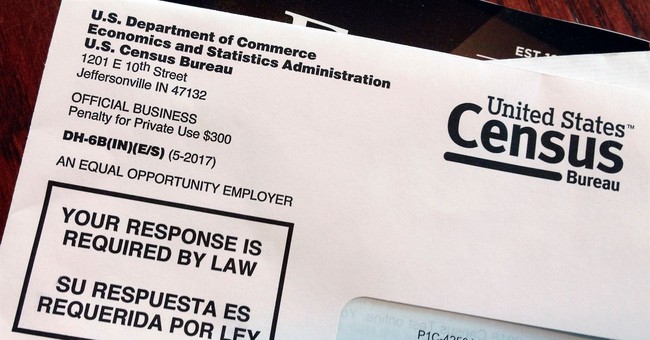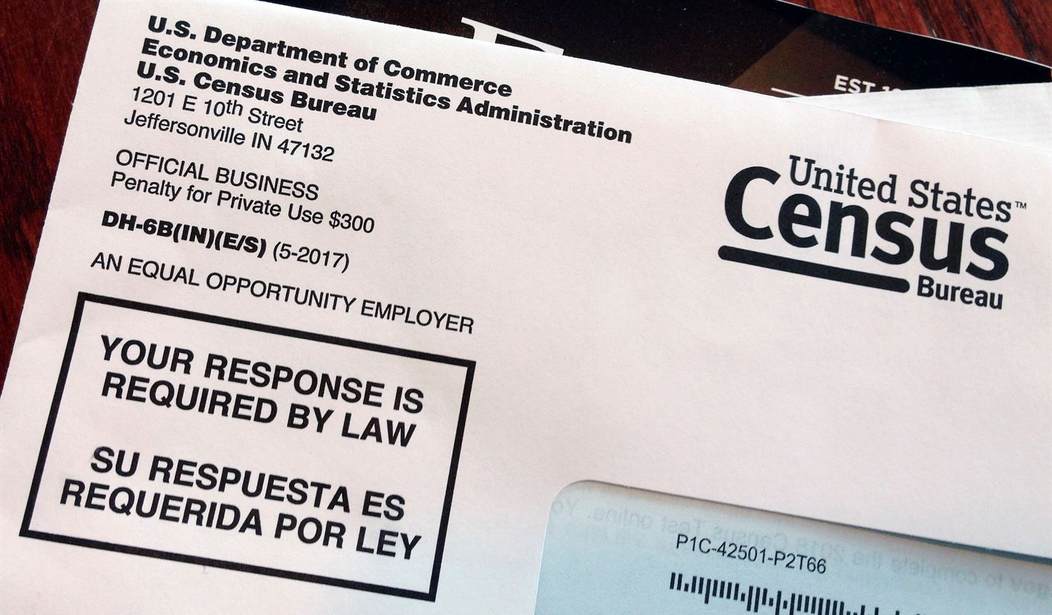
If you are on Twitter right now you will see “Constitution” is trending. This is not because the leftist detritus that constitutes the majority of Twitter users has suddenly fallen in love with civil liberties and freedom and federalism, it is because President Trump has signed an order directing that the Census Bureau only count US citizens and resident aliens for purposes of redistricting.
BREAKING: at 12:15pm today, Trump will issue patently unconstitutional, fear-mongering EO to stop counting undocumented people in the census. Constitution is clear: the census must count every single person in our nation regardless of status or background. https://t.co/thDA7KA4eG
— Vanita Gupta (@vanitaguptaCR) July 21, 2020
This is immediately doomed. The Constitution says explicitly that the census must count “persons,” not “citizens.” https://t.co/LZcuPvpjq5
— Elie Honig (@eliehonig) July 21, 2020
Always get your perspective from CNN Legal Analysts. They accurately predicted Mike Flynn, Paul Manafort, Roger Stone, and George Papadopoulos ‘flipping’ on President Trump. They gave us details of the illegal deal made at Trump Tower. At least this one is not a failed FBI agent making a living as a poseur counterintelligence investigation.
At issue is whether it is appropriate to include illegal aliens, who can’t vote (except in Democrat districts), in the count of “persons” for the purposes of reapportionment only. It would not be used to divvy up federal largess redistributed to the states. The Supreme Court in Baker vs. Carr declared that congressional districts (and by extension state and local districts) had to contain roughly the same number of voters under the “one man (or person or whatever), one vote” principle. The argument against excluding illegals from the apportionment are based on this decision. If a district has to consist of about 700,000 persons, then your vote if you are, for instance, in a district with 50% illegals (that would be 1/300,000) is more powerful than in a district of all citizens (1/700,000). Where this really comes into play is if a state, like California, has congressional districts awarded to it based on its population of illegals which should, by rights, belong to another state.

CREDIT: New York Times A Census Question That Could Change How Power Is Divided in America
This is how much more (or less) your vote is worth depending upon where you live:

CREDIT: New York Times How the Supreme Court’s Decision on the Census Could Alter American Politics
If you recall, the Census Bureau tried to include a question about citizenship in the 2020 Census. This is a question that has been asked routinely for the past century but, because OrangeManBad, it was suddenly racist and xenophobic. And good ol’ John Roberts sided with the leftists to declare that i’s had not been dotted and t’s crossed and so it could not happen.
This will obviously be litigated until the cows come home and how the Supreme Court goes depends upon if John Roberts had a bad curry the night before or is in search of an admiring headline from The New York Times.
There is an interesting twist to look out for. Note that, despite what the media are claiming, President Trump did not sign an Executive Order. He sent a ‘memorandum’ to the Commerce Department.
Know what else was a ‘memorandum?’ The document that established DACA. That’s right, DACA is a memo written by Janet Napolitano that the Supreme Court, including John Roberts, declared could not be set aside by simply rescinding it because apparently memoranda have a sacred status that we were all previously unaware of. They require the elaborate rule-making procedures of the Administrative Procedures Act to be followed. What Trump has done has created a situation that ensures that even if he loses in 2020 (and let’s face it, we all know he has it in him to do that) that it will make the next administration jump through hoops and litigation to change this memo.
Text of the order
MEMORANDUM FOR THE SECRETARY OF COMMERCE
SUBJECT: Excluding Illegal Aliens From the Apportionment Base Following the 2020 Census
By the authority vested in me as President by the Constitution and the laws of the United States of America, it is hereby ordered as follows:
Section 1. Background. In order to apportion Representatives among the States, the Constitution requires the enumeration of the population of the United States every 10 years and grants the Congress the power and discretion to direct the manner in which this decennial census is conducted (U.S. Const. art. I, sec. 2, cl. 3). The Congress has charged the Secretary of Commerce (the Secretary) with directing the conduct of the decennial census in such form and content as the Secretary may determine (13 U.S.C. 141(a)). By the direction of the Congress, the Secretary then transmits to the President the report of his tabulation of total population for the apportionment of Representatives in the Congress (13 U.S.C. 141(b)). The President, by law, makes the final determination regarding the “whole number of persons in each State,” which determines the number of Representatives to be apportioned to each State, and transmits these determinations and accompanying census data to the Congress (2 U.S.C. 2a(a)). The Congress has provided that it is “the President’s personal transmittal of the report to Congress” that “settles the apportionment” of Representatives among the States, and the President’s discretion to settle the apportionment is more than “ceremonial or ministerial” and is essential “to the integrity of the process” (Franklin v. Massachusetts, 505 U.S. 788, 799, and 800 (1992)).
The Constitution does not specifically define which persons must be included in the apportionment base. Although the Constitution requires the “persons in each State, excluding Indians not taxed,” to be enumerated in the census, that requirement has never been understood to include in the apportionment base every individual physically present within a State’s boundaries at the time of the census. Instead, the term “persons in each State” has been interpreted to mean that only the “inhabitants” of each State should be included. Determining which persons should be considered “inhabitants” for the purpose of apportionment requires the exercise of judgment. For example, aliens who are only temporarily in the United States, such as for business or tourism, and certain foreign diplomatic personnel are “persons” who have been excluded from the apportionment base in past censuses. Conversely, the Constitution also has never been understood to exclude every person who is not physically “in” a State at the time of the census. For example, overseas Federal personnel have, at various times, been included in and excluded from the populations of the States in which they maintained their homes of record. The discretion delegated to the executive branch to determine who qualifies as an “inhabitant” includes authority to exclude from the apportionment base aliens who are not in a lawful immigration status.
In Executive Order 13880 of July 11, 2019 (Collecting Information About Citizenship Status in Connection With the Decennial Census), I instructed executive departments and agencies to share information with the Department of Commerce, to the extent permissible and consistent with law, to allow the Secretary to obtain accurate data on the number of citizens, non-citizens, and illegal aliens in the country. As the Attorney General and I explained at the time that order was signed, data on illegal aliens could be relevant for the purpose of conducting the apportionment, and we intended to examine that issue.
Sec. 2. Policy. For the purpose of the reapportionment of Representatives following the 2020 census, it is the policy of the United States to exclude from the apportionment base aliens who are not in a lawful immigration status under the Immigration and Nationality Act, as amended (8 U.S.C. 1101 et seq.), to the maximum extent feasible and consistent with the discretion delegated to the executive branch. Excluding these illegal aliens from the apportionment base is more consonant with the principles of representative democracy underpinning our system of Government. Affording congressional representation, and therefore formal political influence, to States on account of the presence within their borders of aliens who have not followed the steps to secure a lawful immigration status under our laws undermines those principles. Many of these aliens entered the country illegally in the first place. Increasing congressional representation based on the presence of aliens who are not in a lawful immigration status would also create perverse incentives encouraging violations of Federal law. States adopting policies that encourage illegal aliens to enter this country and that hobble Federal efforts to enforce the immigration laws passed by the Congress should not be rewarded with greater representation in the House of Representatives. Current estimates suggest that one State is home to more than 2.2 million illegal aliens, constituting more than 6 percent of the State’s entire population. Including these illegal aliens in the population of the State for the purpose of apportionment could result in the allocation of two or three more congressional seats than would otherwise be allocated.
I have accordingly determined that respect for the law and protection of the integrity of the democratic process warrant the exclusion of illegal aliens from the apportionment base, to the extent feasible and to the maximum extent of the President’s discretion under the law.
Sec. 3. Excluding Illegal Aliens from the Apportionment Base. In preparing his report to the President under section 141(b) of title 13, United States Code, the Secretary shall take all appropriate action, consistent with the Constitution and other applicable law, to provide information permitting the President, to the extent practicable, to exercise the President’s discretion to carry out the policy set forth in section 2 of this memorandum. The Secretary shall also include in that report information tabulated according to the methodology set forth in Final 2020 Census Residence Criteria and Residence Situations, 83 Fed. Reg. 5525 (Feb. 8, 2018).
Sec. 4. General Provisions. (a) Nothing in this memorandum shall be construed to impair or otherwise affect:
(i) the authority granted by law to an executive department or agency, or the head thereof; or
(ii) the functions of the Director of the Office of Management and Budget relating to budgetary, administrative, or legislative proposals.
(b) This memorandum shall be implemented consistent with applicable law and subject to the availability of appropriations.
(c) This memorandum is not intended to, and does not, create any right or benefit, substantive or procedural, enforceable at law or in equity by any party against the United States, its departments, agencies, or entities, its officers, employees, or agents, or any other person.
DONALD J. TRUMP













Join the conversation as a VIP Member